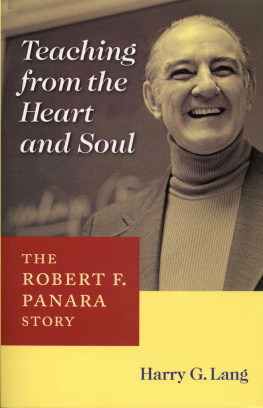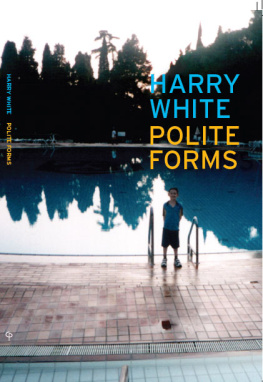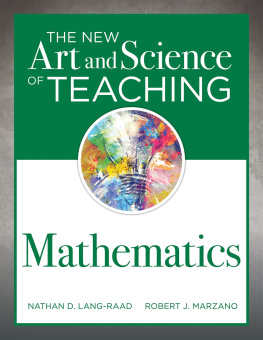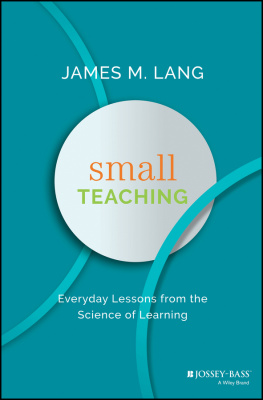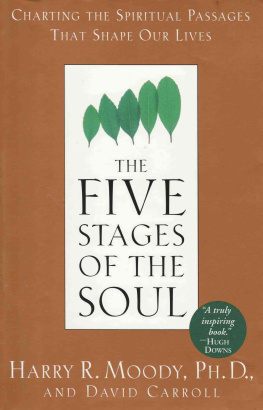Harry G. Lang - Teaching from the Heart and Soul
Here you can read online Harry G. Lang - Teaching from the Heart and Soul full text of the book (entire story) in english for free. Download pdf and epub, get meaning, cover and reviews about this ebook. year: 2016, publisher: Gallaudet University Press, genre: Detective and thriller. Description of the work, (preface) as well as reviews are available. Best literature library LitArk.com created for fans of good reading and offers a wide selection of genres:
Romance novel
Science fiction
Adventure
Detective
Science
History
Home and family
Prose
Art
Politics
Computer
Non-fiction
Religion
Business
Children
Humor
Choose a favorite category and find really read worthwhile books. Enjoy immersion in the world of imagination, feel the emotions of the characters or learn something new for yourself, make an fascinating discovery.
- Book:Teaching from the Heart and Soul
- Author:
- Publisher:Gallaudet University Press
- Genre:
- Year:2016
- Rating:4 / 5
- Favourites:Add to favourites
- Your mark:
- 80
- 1
- 2
- 3
- 4
- 5
Teaching from the Heart and Soul: summary, description and annotation
We offer to read an annotation, description, summary or preface (depends on what the author of the book "Teaching from the Heart and Soul" wrote himself). If you haven't found the necessary information about the book — write in the comments, we will try to find it.
Teaching from the Heart and Soul — read online for free the complete book (whole text) full work
Below is the text of the book, divided by pages. System saving the place of the last page read, allows you to conveniently read the book "Teaching from the Heart and Soul" online for free, without having to search again every time where you left off. Put a bookmark, and you can go to the page where you finished reading at any time.
Font size:
Interval:
Bookmark:

The Robert F. Panara Story
Harry G. Lang
Gallaudet University Press
Washington, D.C. 20002
http://gupress.gallaudet.edu
2007 by Gallaudet University
All rights reserved
Published 2007
Printed in the United States of America
Cover photograph: Courtesy of the Gallaudet University Archives
Library of Congress Cataloging-in-Publication Data
Lang, Harry G.
Teaching from the heart and soul : the Robert F. Panara story / Harry G. Lang.
p. cm.
Includes bibliographical references and index.
ISBN-13: 978-1-56368-358-9 (alk. paper)
1. Panara, Robert. 2. DeafUnited StatesBiography. 3. Teachers of the deafUnited StatesBiography. 4. Deaf authorsUnited StatesBiography. 5. Poets, American20th centuryBiography. 6. Acting teachersUnited StatesBiography. I. Title.
HV2534.P36L36 2007
371.912dc22
[B]
2007006552
 The paper used in this publication meets the minimum requirements of American National Standard for Information SciencesPermanence of Paper for Printed Library Materials, ANSI Z39.48-1984.
The paper used in this publication meets the minimum requirements of American National Standard for Information SciencesPermanence of Paper for Printed Library Materials, ANSI Z39.48-1984.
This book is dedicated to the memory and spirit of Shirley Panara, who showed that there is no end to the power of a beloved wife, mother, and friend in affecting our journeys through life.
This adventure in narrating the life of Robert F. Panara began one evening in late August 2002. My wife, Bonnie Meath-Lang, a professor of performing arts and literature, and I joined Bob and his wife, Shirley, at a baseball game to watch the Rochester (New York) Red Wings, the citys Triple A farm team. We were about a week away from the start of the school year, and this was our last chance to see a game as a foursome that season. Soon Bonnie would be tied up with theater rehearsals in the evenings. Shirley had been fighting a long battle with cancer, but she remained in good spirits. Although the leukemia had gone into remission, she often tired by 9:00 pm. When she was able to join Bob and me at a game, she would usually drive her own car to the stadium so that she could leave a little earlier. She nevertheless made the most of the earlier hours of the evening with her consistently positive attitude.
On this evening, we were chatting between innings when Bob left his seat to get some hot pretzels. Shirley waited until he was out of sight, then turned to me and privately asked me, Would you consider writing a biography of Bob?
I was stunned for a moment. I felt honored that she would invite me to write his life story, but she had also caught me by surprise. More than thirty years worth of memories began to flood my thoughts. I thought back to the 19741975 school year at the National Technical Institute for the Deaf (NTID) at Rochester Institute of Technology (RIT). That spring, Bob was honored with the prestigious Eisenhart Award for Outstanding Teaching. This, in my opinion, was one of his greatest moments. I have known Bob for thirty-seven years and have frequently observed how much he is revered by his students and virtually everyone who knows him. I quickly realized the importance of Shirleys request: If a narration of Bobs personal journey into teaching could help a new generation of teachers see how his excellence in the classroom can be achieved through a lifelong pursuit of beliefs, values, knowledge, and skills, then the effort to document his life would be well worth the time.
Bob is a poet, book author, lecturer, and theater aficionado. As a young deaf boy, he was largely self-educated in the mainstream (in public schools) in an era when special accommodations were not yet available for deaf children. He was also among the first wave of deaf scholars in the twentieth century, and a pioneer in the field of Deaf Studies. Bobs experiences were distinctive, but his life was also a microcosm of the Deaf experienceone mans response to the many debates that have surrounded the education of deaf students.
Bob is also a baseball buff, and after Shirleys invitation it occurred to me that I could write an entire book about his life as a baseball fan. Indeed, for years I had been begging Bob to write his own baseball stories, much as the writer Stephen King had long encouraged Stephen Jay Gould to write his book Triumph and Tragedy in Mudville: A Lifelong Passion for Baseball. Bobs baseball memoirs would have been unique and funny. Although baseball is one of the threads that has held Bobs life togetherand made it colorfulif I focused on Bobs teaching, I would be able to capture only a few of the baseball stories.
On the other hand, teaching is Bobs real legacy. At Gallaudet College, his respected mentor Powrie Vaux Doctor had told him, I believe your niche in life is to be a teacher of the deaf.
In the short time Bob had been gone from his seat at the baseball stadium, I gladly accepted Shirleys invitation to tell the story of Bobs life. The details would be worked out later. When Bob returned with the hot pretzels and Shirley shared with him the gist of our discussion, he grinned with surprise and stuck out his hand in appreciation. That hand had once been grasped by such baseball greats as Babe Ruth, Joe DiMaggio, and Brooks Robinson, I thought.
It was time to get back to watching the game!

Over the next few months, I pored through boxes of newspaper clippings, letters, magazine articles, videotapes, old high school and college yearbooks, and Bobs teaching materials. Though Bob was generally conceded upon his retirement in 1987 to be one of the best teachers in the field of educating deaf students, I did not know where to begin. Bob had often spoken about how several of his former teachers had inspired him, most notably Lloyd Harrison at the American School for the Deaf, Frederick Hughes at Gallaudet College, and, of course, the legendary Powrie Vaux Doctor, known affectionately as Doc, but what was it about Bobs teaching that had led him to touch the lives of an enormous number of people? One evening I found an obscure article that grabbed my attention. It was a term paper for one of his courses at Gallaudet, and Doc had liked it so much that he encouraged Bob to publish it. Bob had written The Significance of the Reading Problem when he was still an undergraduate college student.
What the world needs today, Bob wrote in 1944, is more teaching that comes from the heart and soul, and not of the coldly conservative and somewhat reticent mind.
For me, that precocious pronouncement defined Bobs own teaching. He had defined his teaching ideal before he ever taught his first class. When he wrote this essay, he was still in his early twenties and remarkably well read. Now, six decades later, I set out to examine how this man had achieved this ideal so effectively that generations of his former students fondly remembered his classes and remained his friends well into his retirement years. That evening, in early October 2002, I set out to answer the research question to be addressed in this biography: What had Bob meant by teaching that comes from the heart and soul?

Although this book was written for the Deaf Lives series for Gallaudet University Press, I believe it can be read and enjoyed by anyone who has a passion for teaching (or for baseball). The issues surrounding deafness and sign language were part of Bobs life, but the characteristics of a master teacher that Bob developed were those that would make any teacher exemplary, regardless of that persons own hearing status or that of his students. One challenge for me was to summarize Bobs life in a way that could be appreciated by a broad audience, not just those in Deaf education.
Font size:
Interval:
Bookmark:
Similar books «Teaching from the Heart and Soul»
Look at similar books to Teaching from the Heart and Soul. We have selected literature similar in name and meaning in the hope of providing readers with more options to find new, interesting, not yet read works.
Discussion, reviews of the book Teaching from the Heart and Soul and just readers' own opinions. Leave your comments, write what you think about the work, its meaning or the main characters. Specify what exactly you liked and what you didn't like, and why you think so.

